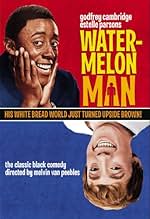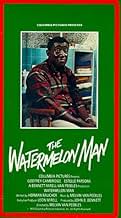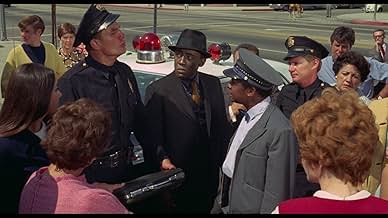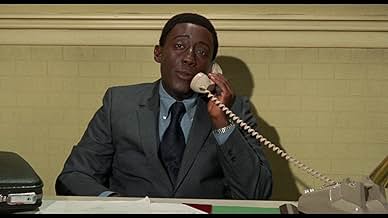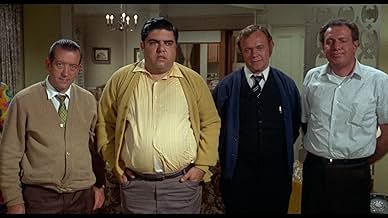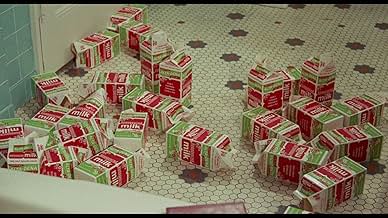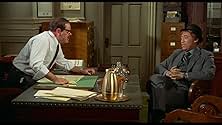IMDb रेटिंग
6.7/10
3.1 हज़ार
आपकी रेटिंग
अपनी भाषा में प्लॉट जोड़ेंJeff Gerber, a racist white man, wakes up one morning to discover that he has become black.Jeff Gerber, a racist white man, wakes up one morning to discover that he has become black.Jeff Gerber, a racist white man, wakes up one morning to discover that he has become black.
- 1 BAFTA अवार्ड के लिए नामांकित
- 1 जीत और कुल 1 नामांकन
Paul Williams
- Employment Office Clerk
- (as Paul H. Williams)
फ़ीचर्ड समीक्षाएं
Melvin Van Peebles' big Hollywood film is a very smart, funny, and in the end tragic satire of race relations in America c. 1970. Today, it doesn't get nearly the hoopla that "Sweet Sweetback" does, but in a lot of ways it's a better movie. Biting satire is often a better way to express righteous anger than simply getting all righteous, and this is an example: under the laughs, this is a deeply angry film.
Godfrey Cambridge is magnificent in his two-tone role, and the supporting cast (including a couple of routines by the great Mantan Moreland) is also very fine. The rage underpinning the whole story doesn't find full, overt expression until the very last scene, which presages Van Peebles' leap into more obviously black revolutionary politics in "Sweetback." A very good, very funny, important film that deserves to be much better known today than it is.
Godfrey Cambridge is magnificent in his two-tone role, and the supporting cast (including a couple of routines by the great Mantan Moreland) is also very fine. The rage underpinning the whole story doesn't find full, overt expression until the very last scene, which presages Van Peebles' leap into more obviously black revolutionary politics in "Sweetback." A very good, very funny, important film that deserves to be much better known today than it is.
First - WHO's Godfrey Cambridge?!?! Yeah - he was a comedian. And a VERY funny one. Sigh.
OK, now that I've said that, let me make a couple of things understood. A lot of people who've written comments about this are either too young to remember the 60's/70's or are trying to relate to this film from today's perspective.
This film was written/directed by Melvin Van Peebles, who - at the time - was (and, by some - unfortunately) considered a 'controversial (black) artist. Second; yes, the makeup is not as good as the wonderful job done on Eddie Murphy in various films/skits, or the Wayans' brothers, but - for the make-up tech of the day - it was VERY good (look at the scene in the beginning when Godfrey's exercising (naked!), and then going to the shower. I just watched it on HD, and it still holds up VERY well (and as an aside; I saw this film first when I was about 10 - on TV. I thought upon seeing it that REALLY was a white man who became black. So, just remember that while you might not think his make-up's up to snuff now, it sure did convince an earlier generation).
Understanding when this film was made, the 'situation' of race relations at the time, and the ability for a (black) artist like Mr. Van Peebles to MAKE this film is necessary in understanding how shocking this film was - in all those areas.
Yes - the film's a bit dated (but who isn't?). But watching this film - and understanding what I've just explained makes it all the more extraordinary. Alex P (miskatonic86), and Definitedoll (just to name a couple) are some of the few who understand this film's importance.
Mr. Cambridge is/was one of the best comics. His 'babbling' - or more accuratley, his riffing on a subject was part of his stand-up style (if you'd like to see Godfrey not as a 'babbling' person, but as a (slightly ominous - and funny) character, check him out in THE PRESIDENT'S ANALYST, or in COTTON COMES TO HARLEM. , amongst other appearances.
He's sorely missed, by me and many others who've seen him either on such shows as ED SULLIVAN, THE MERV GRIFFIN SHOW CAR 54 WHERE ARE YOU, THE DICK VAN DYKE SHOW, I SPY amongst MANY other shows. If not, you can see this huge talent's work on YouTube (YouTube's a GREAT resource for educating yourself about not current performers and artists. It's NOT just a place to look at ...cat's playing pianos, and other garbage).
As a glimpse (by a black artist!) into the 'white man's world,' and the world in general - at that time - Mr. Van Peebles should be given his deserved recognition (and Godfrey, we miss you!).
OK, now that I've said that, let me make a couple of things understood. A lot of people who've written comments about this are either too young to remember the 60's/70's or are trying to relate to this film from today's perspective.
This film was written/directed by Melvin Van Peebles, who - at the time - was (and, by some - unfortunately) considered a 'controversial (black) artist. Second; yes, the makeup is not as good as the wonderful job done on Eddie Murphy in various films/skits, or the Wayans' brothers, but - for the make-up tech of the day - it was VERY good (look at the scene in the beginning when Godfrey's exercising (naked!), and then going to the shower. I just watched it on HD, and it still holds up VERY well (and as an aside; I saw this film first when I was about 10 - on TV. I thought upon seeing it that REALLY was a white man who became black. So, just remember that while you might not think his make-up's up to snuff now, it sure did convince an earlier generation).
Understanding when this film was made, the 'situation' of race relations at the time, and the ability for a (black) artist like Mr. Van Peebles to MAKE this film is necessary in understanding how shocking this film was - in all those areas.
Yes - the film's a bit dated (but who isn't?). But watching this film - and understanding what I've just explained makes it all the more extraordinary. Alex P (miskatonic86), and Definitedoll (just to name a couple) are some of the few who understand this film's importance.
Mr. Cambridge is/was one of the best comics. His 'babbling' - or more accuratley, his riffing on a subject was part of his stand-up style (if you'd like to see Godfrey not as a 'babbling' person, but as a (slightly ominous - and funny) character, check him out in THE PRESIDENT'S ANALYST, or in COTTON COMES TO HARLEM. , amongst other appearances.
He's sorely missed, by me and many others who've seen him either on such shows as ED SULLIVAN, THE MERV GRIFFIN SHOW CAR 54 WHERE ARE YOU, THE DICK VAN DYKE SHOW, I SPY amongst MANY other shows. If not, you can see this huge talent's work on YouTube (YouTube's a GREAT resource for educating yourself about not current performers and artists. It's NOT just a place to look at ...cat's playing pianos, and other garbage).
As a glimpse (by a black artist!) into the 'white man's world,' and the world in general - at that time - Mr. Van Peebles should be given his deserved recognition (and Godfrey, we miss you!).
8tavm
Continuing to review African-Americans in film in chronological order for Black History Month, we're still in 1970 when director Melvin Van Peebles makes his first major studio feature having previously done a critically acclaimed independent one called Story of a Three Day Pass. He casts comedian Godfrey Cambridge as Jeff Gerber who we initially meet as an obnoxious white insurance man-along with wife Althea (Estelle Parsons) and their two kids of different genders-who likes to run when leaving for his job in order to beat the bus. By the way, the light-skinned makeup on Cambridge is about as convincingly white on him as it was on Eddie Murphy in the "White Like Me" short film he did on "Saturday Night Live", that is, not much. Anyway, when the change comes, well, that's when all hell breaks loose! Now, knowing what I know about ironic humor concerning stereotypes, I found the whole thing just a little over-the-top and, you know what? I also found the whole thing hilarious! I mean, how can you not laugh at the attempts Godfrey keeps making to turn himself "back" like drinking lots of milk or putting his face in plaster. Plus, there's many funny sudden turns from now-"brothers" like the bus driver played by D'Urville Martin who claims to be Hispanic or Mantan Moreland as the counterman at his regular eatery who, when asked to look at his skin, says, "I don't need to look at your skin, I can see my own!" And wait till you see how Three Stooges regular supporting player Emil Sitka reacts when he gets attacked by Jeff over some new sunlamps! Not to mention Jeff's bed scenes with a flirtatious secretary named Erica (Kay Kimberly). I think I've said enough so all I'll say now is that Van Peebles provides much funny stuff from Herman Raucher's script in addition to his own contributions with his occasionally distorted score. So on that note, Watermelon Man comes highly recommended. P.S. It's quite interesting seeing who's also in this movie besides those I've already mentioned like singer/songwriter Paul Williams-here credited with the middle initial H-as an employment clerk or a young girl named Erin Moran-later to portray the teen Joanie Cunningham on "Happy Days"-as daughter Janice Gerber.
Somewhat unevenly charts the journey of a successful, loud and bigoted insurance salesman's transition from loathed go-getter to loathed gone-goner. The early twist in the tale, allows an opportunity to see a strong central character face a new challenge. However, sadly, the storyline passes up the chance to see a fighter fighting and the direction becomes bogged down in a realisation that Gerber is beaten from the very moment he is plunged into what the film perceives as an underclass. A particular shame, therefore, as it declares race crossover to be a sentence as opposed to an alternative - there is no real optimism afforded to Gerber after the key white/black event and the film might have been stronger with such an exploration.
The film can be disturbing; but with slick,in your face, stateside put-downs 'The Watermelon Man' certainly enters a sensitive subject area head-first and allows the viewer to make an early judgement.
Whilst the storyline delivers meagre reward in terms of development, there is enough here to warrant a recommendation. Cambridge is outstanding as the hounder who becomes the hounded and the spine of the film is its humour bordering on the cheap for sure, but funny, often hilarious and providing the piece with an underlying energy. Racing the bus to work on foot, crudely separating the mugs from their money, learning to take hate on the chin its all here.
The strength of the final ceremony/scene smacks of eventual acceptance, a sense of belonging and possibly a new way forward; this will shock many as it is bitter-sweet, turning laughter into cold realism. Perhaps Van Peebles was taking the easy option? I think a sequel would have been a fitting reward.
I rate it highly, even after considering its faults.
*********************************************************
UPDATED REVIEW: Today is 1 March 2005 and, courtesy of USPS, Amazon/Lasercorner.com and Travel Inn West 42nd St, NYC (long story ), I have now received the DVD of this film. I first saw it in the early 1980's and have been raving on about it ever since, saying to anybody that wanted to listen, that it was hysterically funny. It still cannot be purchased directly in England.
So today I watched it again, in the new high definition print. I want to amend my original review
The film made me feel guilty about how much I laughed when I first saw it. Yes, it still has great comic moments but there is so much more to it. Scene 11 'property values', sees Jeff Gerber's formerly pleasant neighbours confront him at home and they offer him $100,000 for him to move out of the area. This scene made me feel sickened. Firstly because it shows just how bad the racial situation was in America (surely it has improved since then??) and secondly because, on the first viewing all those years ago, I just didn't "get it" I saw an overall humour, where I should have seen the out and out bigotry, ignorance and sadness. After this pivotal scene Gerber tells his boss to stick his job and he moves on to get his own insurance business, settle into a community that he likes, reforms a long-distance dialogue with his blinkered wife and simply get on with being Jeff Gerber. In that respect my original review is seriously flawed as he is not completely beaten by race crossover at all in fact he makes it work for him and a lot of positives come out in the final analysis. It uplifted me.
Hey, enough of the deepness! It is still a great film to own, share and talk about, even after its flaws are considered. I just felt that I hadn't appreciated the finer points of it until now, many years later.
The film can be disturbing; but with slick,in your face, stateside put-downs 'The Watermelon Man' certainly enters a sensitive subject area head-first and allows the viewer to make an early judgement.
Whilst the storyline delivers meagre reward in terms of development, there is enough here to warrant a recommendation. Cambridge is outstanding as the hounder who becomes the hounded and the spine of the film is its humour bordering on the cheap for sure, but funny, often hilarious and providing the piece with an underlying energy. Racing the bus to work on foot, crudely separating the mugs from their money, learning to take hate on the chin its all here.
The strength of the final ceremony/scene smacks of eventual acceptance, a sense of belonging and possibly a new way forward; this will shock many as it is bitter-sweet, turning laughter into cold realism. Perhaps Van Peebles was taking the easy option? I think a sequel would have been a fitting reward.
I rate it highly, even after considering its faults.
*********************************************************
UPDATED REVIEW: Today is 1 March 2005 and, courtesy of USPS, Amazon/Lasercorner.com and Travel Inn West 42nd St, NYC (long story ), I have now received the DVD of this film. I first saw it in the early 1980's and have been raving on about it ever since, saying to anybody that wanted to listen, that it was hysterically funny. It still cannot be purchased directly in England.
So today I watched it again, in the new high definition print. I want to amend my original review
The film made me feel guilty about how much I laughed when I first saw it. Yes, it still has great comic moments but there is so much more to it. Scene 11 'property values', sees Jeff Gerber's formerly pleasant neighbours confront him at home and they offer him $100,000 for him to move out of the area. This scene made me feel sickened. Firstly because it shows just how bad the racial situation was in America (surely it has improved since then??) and secondly because, on the first viewing all those years ago, I just didn't "get it" I saw an overall humour, where I should have seen the out and out bigotry, ignorance and sadness. After this pivotal scene Gerber tells his boss to stick his job and he moves on to get his own insurance business, settle into a community that he likes, reforms a long-distance dialogue with his blinkered wife and simply get on with being Jeff Gerber. In that respect my original review is seriously flawed as he is not completely beaten by race crossover at all in fact he makes it work for him and a lot of positives come out in the final analysis. It uplifted me.
Hey, enough of the deepness! It is still a great film to own, share and talk about, even after its flaws are considered. I just felt that I hadn't appreciated the finer points of it until now, many years later.
In Watermelon Man, director Melvin Van Peebles expresses complex ideas about race and racism in a sophisticated but humorous way. At that, however, if you do not have a strong taste for grotesques--in a formal sense ("outlandish or bizarre; ludicrous or incongruous distortion")--you may not enjoy the film as much as I did. It is something of a surreal, occasionally psychedelic caricature, but as such, it does what all good caricature should do--it emphasizes the truth without being strict realism or "naturalism".
Watermelon Man is the story of Jeff Gerber (Godfrey Cambridge). He's something of a strange dweeb who nevertheless has a stereotypical white-bread suburban existence. He's got a wife, two preadolescent kids, a nice home with a manicured lawn, and so on. He's also something of a health nut (although humorously, Cambridge wasn't exactly in great shape when they shot the film). As the film opens, he's busy exercising while his wife is trying to capture a few more minutes of sleep. He regularly uses a sun lamp. He takes the bus to his insurance salesman job, but instead of catching it right down the street, he races it through the neighborhood every day, the goal being to beat it to the last stop before it gets on the highway.
Jeff presents himself as happy-go-lucky and quite a joker, but he's a bit obnoxious and boorish, plus he shows himself to be racist and a male chauvinist, although he's not exactly gung ho about sleeping with his wife.
Just as we're learning about Jeff's routine, something unusual happens--he wakes up in the middle of the night as a black man. At first he thinks it's a nightmare, but it doesn't go away. He blames it on the sun lamp. He blames it on food he's ingesting. The bulk of Watermelon Man has Jeff trying to at first conquer, then later deal with his newfound "problem".
If you've seen both films, you might find it odd that Van Peebles made Watermelon Man before Sweet Sweetback's Baadasssss Song (1971). Unlike Sweet Sweetback, which is intriguing in its own way, but not near as good of a film artistically and technically, the direction in Watermelon Man is finely nuanced and sophisticated, the cinematography is crisp and attractive and technical elements such as sound are superb. I suppose this might be an interesting lesson in how crucial budget and "legitimacy" can be for film-making. It gives access to the finest materials and resources, including a large stable of professionals with narrow specialties. At that, however, Watermelon Man is not nearly as respected now as Sweet Sweetback because of what Sweet Sweetback represents, both ideologically and influentially in the film industry. Sweet Sweetback was something of a revolutionary (and very psychedelic) cry for African-American rights, and it helped launch not only the blaxploitation craze of the 1970s, but also fiercely independent film-making.
Yet, Watermelon Man is just as unique and important in what it has to say about race, even if it's not violent or pornographic, and not bizarre in the same way. Once Jeff becomes black, everything about his life changes. There isn't a person around who doesn't relate to him differently, with many having a polar opposite reaction to him--both his white friends (and family, of course) and his black acquaintances (they weren't friends, exactly, when Jeff thought he was white). Everyone wants to exploit his newfound state, including his boss. Van Peebles makes a sly transition from the beginning to the end of the film that goes from white-bread sitcom to something of a militant blaxploitation flick in a way that you barely even notice.
A large part of what makes Watermelon Man so odd is Godfrey Cambridge. His performance is way over the top and consistently bizarre, but for some of us, in some contexts (such as for me in this context), this kind of bizarre, over the top material works extremely well--in fact, I tend to prefer this to realism. The other performances are at least interesting, even if they're not all good in a conventional wisdom evaluation, but Cambridge really carries the film.
Equally bizarre and a bit disturbing is Cambridge's make-up as a white man. The make-up is extremely well done--it's difficult to picture Cambridge as he really looks underneath it all, but given the character's disposition, Cambridge as a white man comes off as freakish to say the least.
Van Peebles' direction is extremely admirable. He's not afraid to take all kinds of thrilling chances, including such unusual moves as quick pans to go from character to character in a conversation and odd intrusions of psychedelia, such as the scene that suddenly starts flashing different negative exposure images, or the scene that stops to insert commentary that resembles silent film intertitles.
Van Peebles also did the music here, as he did in Sweet Sweetback, and it's just as weird. Near the end of the film, there's an extended version of a song that rips-off "Heard It Through The Grapevine" that features a vocal that even The Residents would raise an eyebrow to. Again, I love weird stuff, so I was happier than a pig in, um, mud.
If there's anything less than satisfactory about Watermelon Man, it's that it engenders sadness that Van Peebles wasn't able to talk the helm more often. He made a controversial move in this film by changing the ending in the original script, as he rightfully should have done (Columbia originally wanted an "it was all a dream" ending, which would have been ridiculous and insulting, to say the least), and that, combined with his independent production of Sweet Sweetback the following year, didn't exactly put him on Hollywood's successful brownnoser list.
Watermelon Man is the story of Jeff Gerber (Godfrey Cambridge). He's something of a strange dweeb who nevertheless has a stereotypical white-bread suburban existence. He's got a wife, two preadolescent kids, a nice home with a manicured lawn, and so on. He's also something of a health nut (although humorously, Cambridge wasn't exactly in great shape when they shot the film). As the film opens, he's busy exercising while his wife is trying to capture a few more minutes of sleep. He regularly uses a sun lamp. He takes the bus to his insurance salesman job, but instead of catching it right down the street, he races it through the neighborhood every day, the goal being to beat it to the last stop before it gets on the highway.
Jeff presents himself as happy-go-lucky and quite a joker, but he's a bit obnoxious and boorish, plus he shows himself to be racist and a male chauvinist, although he's not exactly gung ho about sleeping with his wife.
Just as we're learning about Jeff's routine, something unusual happens--he wakes up in the middle of the night as a black man. At first he thinks it's a nightmare, but it doesn't go away. He blames it on the sun lamp. He blames it on food he's ingesting. The bulk of Watermelon Man has Jeff trying to at first conquer, then later deal with his newfound "problem".
If you've seen both films, you might find it odd that Van Peebles made Watermelon Man before Sweet Sweetback's Baadasssss Song (1971). Unlike Sweet Sweetback, which is intriguing in its own way, but not near as good of a film artistically and technically, the direction in Watermelon Man is finely nuanced and sophisticated, the cinematography is crisp and attractive and technical elements such as sound are superb. I suppose this might be an interesting lesson in how crucial budget and "legitimacy" can be for film-making. It gives access to the finest materials and resources, including a large stable of professionals with narrow specialties. At that, however, Watermelon Man is not nearly as respected now as Sweet Sweetback because of what Sweet Sweetback represents, both ideologically and influentially in the film industry. Sweet Sweetback was something of a revolutionary (and very psychedelic) cry for African-American rights, and it helped launch not only the blaxploitation craze of the 1970s, but also fiercely independent film-making.
Yet, Watermelon Man is just as unique and important in what it has to say about race, even if it's not violent or pornographic, and not bizarre in the same way. Once Jeff becomes black, everything about his life changes. There isn't a person around who doesn't relate to him differently, with many having a polar opposite reaction to him--both his white friends (and family, of course) and his black acquaintances (they weren't friends, exactly, when Jeff thought he was white). Everyone wants to exploit his newfound state, including his boss. Van Peebles makes a sly transition from the beginning to the end of the film that goes from white-bread sitcom to something of a militant blaxploitation flick in a way that you barely even notice.
A large part of what makes Watermelon Man so odd is Godfrey Cambridge. His performance is way over the top and consistently bizarre, but for some of us, in some contexts (such as for me in this context), this kind of bizarre, over the top material works extremely well--in fact, I tend to prefer this to realism. The other performances are at least interesting, even if they're not all good in a conventional wisdom evaluation, but Cambridge really carries the film.
Equally bizarre and a bit disturbing is Cambridge's make-up as a white man. The make-up is extremely well done--it's difficult to picture Cambridge as he really looks underneath it all, but given the character's disposition, Cambridge as a white man comes off as freakish to say the least.
Van Peebles' direction is extremely admirable. He's not afraid to take all kinds of thrilling chances, including such unusual moves as quick pans to go from character to character in a conversation and odd intrusions of psychedelia, such as the scene that suddenly starts flashing different negative exposure images, or the scene that stops to insert commentary that resembles silent film intertitles.
Van Peebles also did the music here, as he did in Sweet Sweetback, and it's just as weird. Near the end of the film, there's an extended version of a song that rips-off "Heard It Through The Grapevine" that features a vocal that even The Residents would raise an eyebrow to. Again, I love weird stuff, so I was happier than a pig in, um, mud.
If there's anything less than satisfactory about Watermelon Man, it's that it engenders sadness that Van Peebles wasn't able to talk the helm more often. He made a controversial move in this film by changing the ending in the original script, as he rightfully should have done (Columbia originally wanted an "it was all a dream" ending, which would have been ridiculous and insulting, to say the least), and that, combined with his independent production of Sweet Sweetback the following year, didn't exactly put him on Hollywood's successful brownnoser list.
क्या आपको पता है
- ट्रिवियाMelvin Van Peebles: The artist who letters Jeff Gerber's new office door.
- गूफ़Dr. Wainwright asks Jeff if he knows that the first man to die in an American war was Crispus Atticus. The man's name was actually Crispus Attucks, NOT Atticus. The doctor puts in an extra syllable.
- भाव
Delivery Man: That guy needs a sun lamp like Fred Astaire needs dancing lessons.
- कनेक्शनFeatured in The Real Deal: What It is (2003)
- साउंडट्रैकLove, That's America
Written and performed by Melvin Van Peebles
टॉप पसंद
रेटिंग देने के लिए साइन-इन करें और वैयक्तिकृत सुझावों के लिए वॉचलिस्ट करें
- How long is Watermelon Man?Alexa द्वारा संचालित
विवरण
बॉक्स ऑफ़िस
- बजट
- $10,00,000(अनुमानित)
- चलने की अवधि1 घंटा 40 मिनट
- ध्वनि मिश्रण
- पक्ष अनुपात
- 1.85 : 1
इस पेज में योगदान दें
किसी बदलाव का सुझाव दें या अनुपलब्ध कॉन्टेंट जोड़ें



